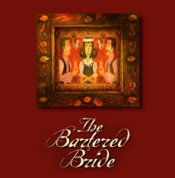The occasion not only ensured a packed house at the premiere, but also drew attention of the local chapter of the Czech-Slovak Heritage Association. Its members, in national costumes, attended en masse, making for a colorful and slightly surreal theater lobby.
Among the production’s international cast, Dana Buresova’s Marenka appropriately enough turned out to be the true star of Smetana’s charming little village. The Czech soprano laughed, pouted, and schemed her way triumphantly through the evening, and fully deserved her standing ovation at the end of it. The singer’s voice was strong, pure, and even in all registers; it carried easily, and she even thrilled the audience with a couple of impressive – albeit not entirely necessary in Smetana’s score – high Cs. The only thing of which I could not quite approve in this Marenka was her taste in men, for between the two sons of the honorable Tobias Micha (portrayed honorably by Ukrainian-Canadian bass Alexander Savtchenko) I might have chosen the younger one. American tenor Doug Jones offered an engaging and endearing portrait of the stammering village fool Vasek, and in the process revealed not only a lovely lyric tenor voice, but a genuine comic gift. Meanwhile, contrary to my own expectations, I was not that impressed with the heavily advertised talents of the Czech tenor Valentin Prolat as Jenek. Prolat wowed the audience sufficiently in a couple of powerful scenes in which his strong high register was impressively on display; he acted well, and blended very sweetly with Marenka in the duets, but far too often his sound felt somehow “switched off,” making it difficult to be completely satisfied with his performance.
Despite at times sounding a little thin (particularly in the string section), the orchestra was excellent, conducted impeccably by yet another Czech import, Oliver von Dohnányi. Throughout the performance he kept good balance, asserting his presence but letting the singers dominate as they should in a score such as this one. The tour-de-force of an overture (those unfamiliar with the music should imagine the fugue from Zauberflöte mixed with Mendelssohn’s elves at three times the speed) was particularly impressive – vigorous and energetic, yet clean and rhythmically precise.
Rheinhard Heinrich’s décor took a fold-out children’s book as inspiration, creating a set of white-and-brown cardboard dollhouses (with removable front walls allowing one to see their interiors) that were “folded” in and out throughout the performance in full view of the audience. Unfortunately, this clever and efficient design proved much too bulky for the small stage of the Baltimore Lyric, which made for an uncomfortably crowded marketplace with close to forty choristers on stage trying (not always convincingly) to approximate a polka. The Act 2 furiant turned out much better, as the space dilemma was resolved by sidelining the chorus and leaving what was left of center stage to three pairs of professional dancers.
The stage director, James McNamara evidently found The Bartered Bride, a slow-moving number opera, to be a challenge, and his approach was somewhat a stylistic mixture. Most scenes were staged realistically and packed full with stage business, perhaps too aggressively at times (e.g., while distraught Marenka was pouring out her heart into an opening “Where are you from?” aria, oblivious groom-to-be Jenek busied himself with first breaking and then fixing a wooden stool he had first conveniently dragged out of a nearby house). Meanwhile, several key numbers for the principals were presented as cinematic close-ups, with lights dimmed, soloists spotlighted (Jenek’s Act 2 aria was even performed in front of the lowered curtain), and “stage realism” suspended in favor of slightly old-fashioned symbolism, Hollywood-style. Not that the staging solution for each specific scene was necessarily unsuccessful (although I do take exception to the Act 3 sextet – a comic family disagreement made to project supernatural terror), but at times I found myself wishing that the director would just make up his mind.
To the audience, however, one of the most memorable moments in the whole production was undoubtedly the circus scene. Taking cue from the geographical provenance of the Indian and the fake grizzly bear, McNamara decided to turn the entire troupe, introduced by the (deliberately?) out-of-tune trumpet fanfares, into a Wild Wild West show. The Circus Master, sporting a Texas accent and a cowboy hat, resurrected for this occasion the spoken dialog tradition from the first version of Smetana’s score, although I doubt that the text of his opening announcement would have been recognized by the composer. Among other things, everyone in this original-language production were suddenly speaking English, including the chorus that reacted with evident comprehension to the Circus Master’s advertisement, and Vasek who during his comic attempts to woo the dancer Esmeralda somehow managed to lose his Czech if not his stammer. The public was treated to a parade of jugglers, acrobats, clowns on stilts, a grunting Indian, a bearded lady weightlifter, and a badly trained but brightly costumed dog (yes, a real one) that jumped through one large hula hoop, missed the other, but would have its chance at a curtain call nonetheless...
After a fashion, the misadventures of the circus mirrored the fortunes of the larger show of which it was a part. The bride was sold with some panache, a few unfortunate accidents, and some questionable decisions that warranted raised eyebrows from the purists such as myself. Yet, at the end of it all, Baltimore Lyric did manage to put on a good show – and fundamentally, a good show is what opera production is all about.
Olga Haldey
